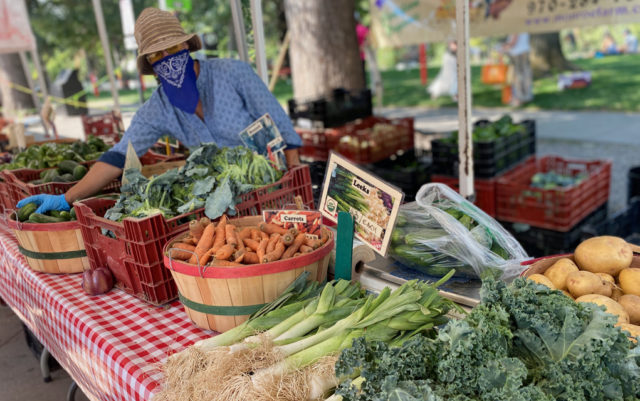
The pandemic has hit so many businesses hard this year, perhaps none more so than those in the food industry. While many farmers and ranchers have been able to adapt in order to make ends meet, much still needs to be done. So Boulder Weekly asked Brian Coppom, executive director of the Boulder County Farmers Market, to share how folks can keep local farmers and ranchers in mind this election season and beyond.
“I’ll take a look at it.”
Such was the underwhelming reply last week when one of our Colorado politicians was asked whether he would support a federal bill directing more aid to small and mid-size farmers. In this year’s heated election cycle, one might be excused for thinking the concern of community agriculture needs to take a back seat to more pressing issues, like COVID-19 and who will become our next president. However, such dismissal is ill-advised and short-sighted. The compounded effects of unprecedented challenges Colorado farms and ranchers are experiencing this year is reducing the reliability of our food system and will affect the lives of Coloradans for years to come.
Farms and ranches were already struggling due to several years of declining prices, increasing costs and the impacts of trade tariffs — resulting in a net farm income drop of 15% in 2018 alone. Trade and COVID-19 relief packages, including the Marketing Facilitation Program and Coronavirus Food Assistance Program, have served the largest of these operations, with over 50% of benefits going to just the top 10% largest farms and ranches. Market disruption caused by COVID-19, though, was indiscriminate and the impacts reached far down the supply chain to the small and mid-size farmers and ranchers who we know as our neighbors.
Fortunately, there are currently several efforts to support and strengthen Colorado’s smaller operations that make up the heart of our agricultural system. These critical efforts, though, will fail if they are subject to the usual partisan dynamics. When making your election choices, insist that your incumbent congressman or congresswoman and to-be-decided Colorado candidates for U.S. Congress vote to advance the efforts below to support the future of our local food system.
The Local and Regional Farmer and Market Support Act (Local Farmers Act) is one of two important federal bills. This bill, introduced in the House by Congresswoman Alma Adams (D-North Carolina), will provide emergency grants to farmers and ranchers selling locally, farmers markets and food hubs. Importantly, $50 million of funding is dedicated to historically underserved BIPOC farmers and ranchers. This bill is the only relief effort that is directed to small and mid-sized operations and will provide critical funding to support our local food system.
“Farmers and ranchers have been under intense stress and market uncertainty for months during the ongoing COVID-19 pandemic, and Representative Adams recognizes that Congress must step up to help,” Eric Deeble, policy director at National Sustainable Agriculture Coalition, said in a press release. “This bill offers the need for more effective, targeted aid that meets the real needs of the producers and local food businesses working hard to feed their communities right now.”
The majority of animal processing and distribution infrastructure is made for large animal operations. These facilities dominate the supply chain and process thousands of animals a day, leaving small ranchers with few efficient options to have their livestock processed. The Strengthening Local Processing Act is a bi-partisan bill introduced by Reps. Chellie Pingree (D-Maine) and Jeff Fortenberry (R-Nebraska) that will authorize competitive grants to small establishments or new small-scale slaughter facilities for activities related to COVID-19 response and recovery. It will also authorize new grant programs for colleges and universities to establish or expand meat processing training programs and for existing or new small processors to develop safety plans and expand needed infrastructure such as cold storage and sanitation systems. These programs will create market efficiencies and strengthen the small ranchers who make up more than 80% of Colorado’s ranching population.
“There is a broadening concern over corporate concentration in the meatpacking industry. In a previous time, we had more local meat processing. This bill helps stimulate a return to that previous model, creating a robust market in local economies, linking the farm to the family,” said Rep. Fortenberry, ranking member on the House Appropriations Subcommittee on Agriculture, Rural Development, Food and Drug Administration.
The Coronavirus Food Assistance Program (CFAP) makes direct payments to commodity farmers for lost sales due to COVID-19. The first CFAP round of $19 billion, announced in April, was specifically directed to commodity growers and left out smaller farms that sold locally and regionally. CFAP 2.0 was introduced in September to further expand commodity funding but also expanded eligible crops including specialty crops (known to us laymen as vegetables). CFAP 2.0 is an improvement over the original version and may benefit local farms who are able to take advantage of it.
Finally, rank partisanship has prevented Congress from approving budgets when needed and relies on Continuing Resolutions to keep the government running for years. True to form, a Continuing Resolution was enacted in late September, delaying final budget approvals and leaving vital increases in agricultural programs unfunded. Farmers are again left to endure an indeterminate amount of time (weeks, months, years?) without needed support. Some will not be able to endure. Make sure your representative knows that a functioning government and implementing hard-won program increases must be a top priority. Our Colorado farmers and ranches deserve and depend on it.














